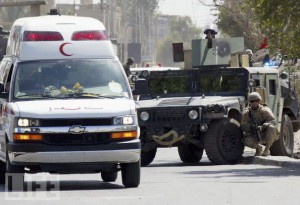Baghdad Bombings of Retaliation
Multiple bombs were detonated in different parts of Baghdad and western Iraq on Friday, killing at least 60 and injuring hundreds. The attacks are assumed to have come from Al-Queda in response to the killing and capture of multiple Al-Queda suspects and leaders by U.S. and Iraqi forces.
Just five days before the bombings, it was reported that two major Al-Queda leaders were killed in a coordinated attack, a serious concern for the insurgency. On March 11th, another major Al-Queda leader had been captured, and has provided US and Iraqi forces with intelligence that has helped map Al-Queda’s presence in Iraq.
Iraqi leaders promoted the successful raid and suggested that the absence of the deceased Al-Queda figureheads would create significant progress in eradicating the insurgency, but retaliatory attacks were expected.
Unlike most of the sudden bombings of recent months, however, suicide bombers were not used in any of the incidents Friday. Instead, car bombs and other remote devices were placed near mosques, a market, and near the headquarters of Moktada al-Sadr’s political movement.
Sadr’s success in last month’s election moved Iraq closer to realizing a new government, but very likely inspired Al-Queda to choose their headquarters for an attack.
Although many lives were lost, the attacks seem to stem from a growing sense of confusion within the Al-Queda network. As more of their important leaders are captured or killed, their access to important resources and information is beginning to shrink.
The discovery and eradication of major Al-Queda members is evidence of improved coordination between U.S. and Iraqi forces. With the Iraq election moving to a recount and extended delays, that coordination is essential for the safety of the Iraqi people.


Leave a Reply